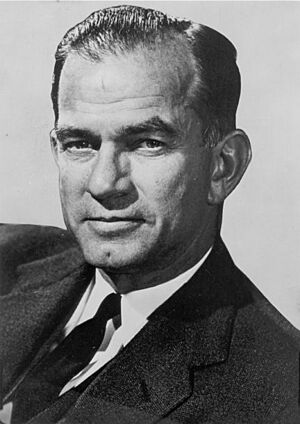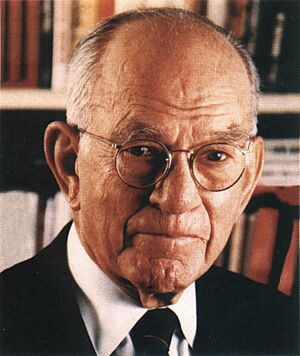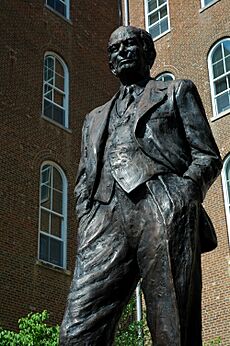J. William Fulbright facts for kids
Quick facts for kids
J. William Fulbright
|
|
|---|---|
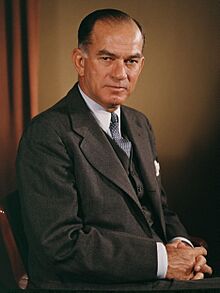
Fulbright in 1960
|
|
| United States Senator from Arkansas |
|
| In office January 3, 1945 – December 31, 1974 |
|
| Preceded by | Hattie Caraway |
| Succeeded by | Dale Bumpers |
| Member of the U.S. House of Representatives from Arkansas's 3rd district |
|
| In office January 3, 1943 – January 3, 1945 |
|
| Preceded by | Clyde T. Ellis |
| Succeeded by | James William Trimble |
| Personal details | |
| Born |
James William Fulbright
April 9, 1905 Sumner, Missouri, U.S. |
| Died | February 9, 1995 (aged 89) Washington, D.C., U.S. |
| Political party | Democratic |
| Spouses |
|
| Education | |
James William Fulbright (April 9, 1905 – February 9, 1995) was an American politician and leader. He represented Arkansas in the United States Senate from 1945 until 1974. He was the longest-serving chairman of the United States Senate Committee on Foreign Relations.
Fulbright is best known for believing that countries should work together. He also strongly opposed the Vietnam War. He created the famous international exchange program called the Fulbright Program.
He admired Woodrow Wilson and loved England. Fulbright believed the U.S. should join World War II early and help Great Britain. He first shared these ideas as a college professor. Later, as a member of the U.S. House of Representatives, he wrote the Fulbright Resolution. This resolution supported international peacekeeping and the idea of the United Nations.
After joining the Senate, Fulbright supported European countries working closely together. He saw the Cold War as a struggle between the U.S. and Russia, not just different ideas. He focused on stopping Soviet expansion in Europe. He also worried about nuclear annihilation. He preferred talking and political solutions over military action. After the Cuban Missile Crisis, he supported a policy of détente, which means easing tensions.
His views and his powerful role as Chairman of the Senate Foreign Relations Committee made him a strong critic of the Vietnam War. He initially supported the Gulf of Tonkin resolution in 1964. But his relationship with President Lyndon Johnson changed after the U.S. bombing of Pleiku in 1965. Starting in 1966, he led important hearings that looked into the war. These hearings may have helped lead to the U.S. withdrawal from Vietnam.
In domestic issues, Fulbright was a Southern Democrat. He signed the Southern Manifesto, which opposed racial integration. However, he also spoke out against the anti-Communist actions of Joseph McCarthy.
Contents
- Early Life and Education
- Career in Law and Education
- U.S. House of Representatives
- U.S. Senator (1945–1974)
- Political and Foreign Policy Views
- Retirement and Death
- Legacy
- See also
Early Life and Education
James William Fulbright was born on April 9, 1905, in Sumner, Missouri. His parents were Jay and Roberta Fulbright. In 1906, his family moved to Fayetteville, Arkansas. His mother was a successful businesswoman and a well-known newspaper publisher.
Fulbright attended an experimental school at the University of Arkansas.
University of Arkansas Studies
Fulbright earned a history degree from the University of Arkansas in 1925. He was president of the student body. He was also a star player on the Arkansas Razorbacks football team from 1921 to 1924.
Oxford University Experience
Fulbright later studied at Oxford University in England. He was a Rhodes Scholar at Pembroke College and graduated in 1928. His time at Oxford made him love England for the rest of his life.
At Oxford, he played rugby and lacrosse. Every summer, he went to France to enjoy life and improve his French.
Fulbright said his time at Oxford broadened his views. He learned about the "one world" idea from his professor, R. B. McCallum. This idea means that everything in the world is connected. McCallum believed that international groups were the best way to keep global peace. Fulbright stayed close friends with McCallum.
In 1930, Fulbright met his first wife, Elizabeth Kremer Williams. They married on June 15, 1932, and had two daughters.
Fulbright earned his law degree from The George Washington University Law School in 1934. He then worked as an attorney for the U.S. Department of Justice.
Career in Law and Education
Fulbright taught law at the University of Arkansas from 1936 to 1939. In 1939, he became the university's president. This made him the youngest university president in the country. He held this job until 1941. The School of Arts and Sciences at the University of Arkansas is named after him.
In September 1939, Fulbright publicly supported the Allied countries in World War II. He urged the U.S. to stay neutral but to favor the Allies. By summer 1940, he said it was important for America to join the war. He warned that a victory by Nazi Germany would make the world a much worse place.
In June 1941, Governor Homer Martin Adkins suddenly fired Fulbright from the University of Arkansas. Fulbright learned that his mother's newspaper had supported the governor's opponent. This unfair firing made Fulbright interested in politics.
U.S. House of Representatives
Fulbright was elected to the United States House of Representatives as a Democrat in 1942. He served one term. During this time, he joined the House Foreign Affairs Committee.
During World War II, people debated how to achieve peace after the war. Many wanted the U.S. to stop being isolated from other countries. In September 1943, the House passed the Fulbright Resolution. This resolution supported international peacekeeping. It also encouraged the U.S. to join what became the United Nations in 1945. This brought Fulbright national attention.
An analysis by Isaiah Berlin for the British government in 1943 described Fulbright. It called him "a distinguished new-comer to the House." It noted he was "an alert and intelligent member" who wanted the U.S. to gain political benefits from helping allies, not just money. He was seen as an "internationalist."
U.S. Senator (1945–1974)
Fulbright was elected to the Senate in 1944. He defeated Hattie Carraway, the first woman elected to the U.S. Senate. He served five six-year terms. In his first Senate election, he won easily.
Fulbright Program Creation
In 1946, he helped pass a law to create the Fulbright Program. This program offers educational grants (Fulbright Fellowships and Scholarships). It is sponsored by the U.S. Department of State and other countries. The program aims to increase understanding between people from the U.S. and other nations. It does this by exchanging people, knowledge, and skills. It is now one of the most respected award programs and operates in 155 countries.
Truman and Korean War Views
In 1947, Fulbright supported the Truman Doctrine. He voted for American aid to Greece. He also supported the Marshall Plan and joining NATO. Fulbright strongly backed plans for a united Western Europe. He supported the 1950 plan for a European Coal and Steel Community. This was an early step toward the European Union.
In 1949, Fulbright became a member of the Senate Foreign Relations Committee.
After China joined the Korean War in 1950, Fulbright warned against the U.S. escalating the conflict. He said Korea was not important enough to risk World War III. He argued that the Soviet Union was the real enemy, not China. He believed Korea was a distraction from Europe, which he saw as more important.
When President Truman fired General Douglas MacArthur in 1951, Fulbright defended Truman. Fulbright argued that the enemy was imperialist Russia, not communism itself.
Eisenhower and McCarthy Conflict
Fulbright was an early opponent of Senator Joseph McCarthy. McCarthy was a strong anti-Communist. Fulbright saw McCarthy as a demagogue and a threat to American democracy. Fulbright was the only senator to vote against funding McCarthy's investigations in 1954.
Fulbright was worried when McCarthy attacked the Voice of America and the United States Information Agency. This agency oversaw educational exchange programs like the Fulbright Program.
Fulbright spoke out against McCarthy in 1953. McCarthy questioned Fulbright about his program. McCarthy often called him "Senator Halfbright." Fulbright defended the program. He said he had no control over the board that chose students. He also offered to show thousands of statements from students who praised the U.S. This encounter was the last time McCarthy publicly attacked the Fulbright Program. Historians credit Fulbright with saving the program from McCarthyism.
1956 Re-election Campaign
In 1956, Fulbright campaigned for his re-election. He emphasized his opposition to civil rights and his support for segregation. He also highlighted his support for oil companies and farmers in Arkansas. He easily won against his Republican opponent.
Kennedy Administration Role
Fulbright was President John F. Kennedy's first choice for Secretary of State in 1961. However, others in Kennedy's group opposed this, and Dean Rusk was chosen instead.
In April 1961, Fulbright advised Kennedy not to go ahead with the Bay of Pigs invasion. He said, "The Castro regime is a thorn in the flesh. But it is not a dagger at the heart."
On July 30, 1961, Fulbright caused controversy. He said in a TV interview that East Germany had the right to close its border. This was two weeks before the Berlin Wall was built. His statement was widely reported and criticized in West Germany. Some historians suggest Kennedy might have wanted Fulbright to send this signal to the Soviets.
In August 1961, Fulbright spoke about the need for changes in the U.S. system. He believed the President was limited by an old system. He felt the President needed more power to lead the country in foreign relations.
After the 1962 Cuban Missile Crisis, Fulbright changed his view on the Soviet Union. He moved from "containment" to détente, meaning easing tensions. This drew criticism from Senator Barry Goldwater. Fulbright argued that a "total victory" over communism would mean millions of deaths.
The Chicken War
From 1961 to 1964, the U.S. had a "chicken war" with Europe. Inexpensive American chicken caused prices to drop in Europe. Europe then placed tariffs (taxes) on U.S. chicken. This hurt chicken farmers in Arkansas.
Senator Fulbright protested these tariffs. He even threatened to reduce U.S. troops in NATO. The U.S. then put a 25% tariff on imported light trucks, known as the chicken tax.
Johnson Administration and Vietnam
In March 1964, Fulbright spoke about the U.S. needing to adapt to a changing world. He wanted the U.S. to rethink its views on the Soviet Union, Cuba, China, and Latin America.
In May 1964, Fulbright predicted that misunderstandings between France and the U.S. would end. He said French President Charles de Gaulle was admired for his achievements.
In 1965, Fulbright disagreed with President Lyndon B. Johnson's actions in the Dominican Civil War.
Gulf of Tonkin Resolution
On August 4, 1964, Defense Secretary Robert McNamara said North Vietnam attacked an American ship, the USS Maddox. This was known as the Gulf of Tonkin incident. President Johnson then ordered air raids on North Vietnam. He asked Congress to pass a resolution to show U.S. unity. Johnson wanted Fulbright's support because he was respected on foreign policy.
Johnson told Fulbright that the attack happened. He also said the resolution was not meant to start a war in Vietnam. Johnson claimed it was an election-year move to show he was "tough on communism." He also said it would intimidate North Vietnam and make war less likely. Fulbright trusted Johnson due to their friendship. Johnson hinted that Fulbright might become Secretary of State.
On August 6, 1964, Fulbright spoke in the Senate. He urged passing the resolution. He accused North Vietnam of "aggression" and praised Johnson's "restraint." He said the policy aimed to create free states in Southeast Asia through diplomacy. He told other senators the resolution was "harmless" and meant to "pull the rug out from under Goldwater." He said Johnson promised not to get involved in a land war in Asia.
On August 7, 1964, Congress approved the Gulf of Tonkin Resolution. This led to a major increase in the Vietnam War. Fulbright later wrote that many senators would not have voted for it if they knew it would lead to a large-scale war.
Fulbright Hearings and War Opposition
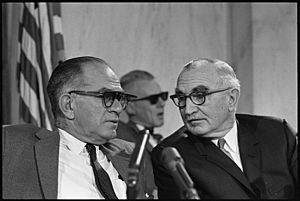
Fulbright learned a lot about Vietnam from French journalist Bernard B. Fall in 1965. Fall's ideas changed Fulbright's thinking. Fulbright realized that Ho Chi Minh was not just a puppet of other countries. Fulbright then studied Vietnam's history deeply.
President Johnson convinced Fulbright to sponsor the Gulf of Tonkin resolution. But their relationship worsened after the 1965 U.S. bombing of Pleiku. Fulbright saw this as Johnson breaking his promise not to escalate the war. Starting in 1966, Fulbright led public hearings on the war.
Fulbright invited President Johnson to appear before his committee in January 1966. Johnson refused.
On February 4, 1966, Fulbright held the first hearings on the Vietnam War. Experts like George F. Kennan and General James M. Gavin testified. Kennan said the war was a wrong use of his containment policy. Gavin said the war could not be won as it was being fought. Johnson tried to distract from the hearings by holding a summit in Honolulu.
As chairman of the Foreign Relations Committee, Fulbright held many hearings on the Vietnam War from 1966 to 1971. Many were shown on TV.
Fulbright was a strong opponent to Johnson. He had a reputation as an expert on foreign policy. During the hearings, Fulbright compared the bombing of Japanese cities in World War II to the bombing of North Vietnam. He spoke about "thousands of little children... being slowly burned to death." Johnson called the hearings "a very, very disastrous break."
Johnson saw Fulbright's criticism as a personal betrayal. He called Fulbright "Senator Halfbright" and mocked him.
In April 1966, Fulbright gave a speech at Johns Hopkins University. He criticized the war. He warned of "the arrogance of power." He said the U.S. was "in danger of losing its perspective." Johnson was furious. He called critics like Fulbright "nervous Nellies."
In 1966, Fulbright published The Arrogance of Power. This book criticized the war and Congress's failure to limit it. His strong criticism challenged the idea that the war was necessary.
By 1967, the Senate was divided. There were "doves" (anti-war), led by Fulbright. There were "hawks" (pro-war), led by Senator John C. Stennis. And there were senators who changed their minds based on public opinion. Johnson tried to please the hawks. Fulbright was careful to criticize the war, not the soldiers.
On July 25, 1967, Fulbright told Johnson to "stop the war." He said Vietnam was hurting U.S. domestic and foreign policy. He threatened to block a foreign aid bill. Johnson accused Fulbright of wanting to ruin America's reputation. Johnson got angry, saying Fulbright had a "blind spot."
In early 1968, Fulbright was sad about the war. He felt Johnson was not listening to other views. However, when Clark Clifford replaced Robert McNamara as Defense Secretary, Fulbright saw hope. Fulbright invited Clifford to a secret meeting with two World War II heroes, General James M. Gavin and General Matthew Ridgway. They both said the U.S. could not win the war. This helped change Clifford's mind.
After the Tet Offensive in 1968, Fulbright called for new hearings on the Gulf of Tonkin incident. He questioned the claims of North Vietnamese attacks. McNamara was called to testify. On March 11, 1968, Secretary of State Dean Rusk appeared. The main topic became Westmoreland's request for more troops. Fulbright insisted Johnson get Congress's approval. Many senators who were once hawks now sided with Fulbright. This showed Congress was turning against the war.
In late October 1968, Johnson announced a halt in bombing North Vietnam. Fulbright hoped this would lead to a ceasefire.
Nixon Administration and Foreign Policy
In March 1969, Secretary of State William P. Rogers testified before Fulbright's committee. Fulbright found the meeting helpful. In April 1969, Fulbright received a letter about the My Lai massacre. This letter from a former soldier described a terrible event in Vietnam.
In May 1969, Fulbright spoke about the U.S. withdrawing from Vietnam. He also talked about changing foreign policy to give less power to the President. On October 15, 1969, Fulbright spoke at a rally against the war. He praised the peaceful protests. President Nixon then asked for support from the "silent majority" for his Vietnam policy. Fulbright said Nixon had "fully and truthfully taken upon himself Johnson's war."
In 1970, Daniel Ellsberg offered Fulbright a copy of the Pentagon Papers. These were secret documents about the war. Fulbright declined to make them public himself. Instead, he asked the Defense Secretary to declassify them. In 1971, Fulbright held more hearings on Vietnam. John Kerry, a Vietnam veteran and future senator, gave important testimony.
In March 1970, Fulbright introduced a resolution. It would prevent President Nixon from using troops in Laos without Congress's approval. He said, "The Senate must not remain silent now while the President uses the armed forces... to fight an undeclared and undisclosed war in Laos." The next month, his committee voted to cancel the 1964 Gulf of Tonkin Resolution.
In August 1970, Fulbright supported a treaty to protect Israel's borders. In October, he questioned a secret 1960 agreement to support Ethiopia's army.
In February 1971, Fulbright wanted a bill to make Nixon administration officials testify before Congress about Vietnam. He said they refused to appear because they didn't like being questioned on TV. In October, Fulbright supported aid for refugees and military aid to Israel. But he opposed aid for Cambodia, Vietnam, Laos, and Greece.
In March 1972, Fulbright asked the Justice Department not to use a documentary about Czechoslovakia 1968 in New York. He said it violated a law that said the agency should only share information about the U.S. abroad. In August, the Senate approved a treaty limiting defense missiles for the U.S. and the Soviet Union.
In July 1973, Fulbright criticized efforts to block trade with the Soviet Union. Some wanted to block trade until the Soviets allowed Jews to leave. Fulbright said living in peace was too important to be affected by "meddling." In August, Nixon chose Henry Kissinger as Secretary of State. Kissinger had good relationships with senators on Fulbright's committee.
In November 1973, Fulbright supported Kissinger's Middle East policy. He said peace was needed before another military truce became a problem. He believed Washington, Moscow, and the United Nations should lead the peace talks.
Fulbright also opposed Nixon's choices for the Supreme Court, Clement Haynsworth and Harold Carswell.
In May 1974, Fulbright revealed a weapon stockpile for South Korea, South Vietnam, and Thailand. The Defense Department confirmed this. In July, Fulbright said nothing major came from Kissinger's testimony about wiretapping. He believed opponents of easing tensions with the Soviet Union wanted to remove Kissinger.
Defeat and Resignation
In 1974, Fulbright lost the Democratic primary election in Arkansas to Governor Dale Bumpers. His views on Vietnam, the Middle East, and Watergate were not popular with many Arkansans. Bumpers won by a large margin.
When he left the Senate in December 1974, Fulbright had been the junior senator from Arkansas for all 29 years. This was because John L. McClellan had entered the Senate two years before him.
Political and Foreign Policy Views
American Foreign Policy Ideas
In The Arrogance of Power, Fulbright shared his thoughts on American foreign policy. He said that throughout U.S. history, there were two main ideas. One was about democracy and kindness. The other was a stricter, less tolerant view. He felt that when things were going well, reason usually won. But when people became very emotional, the stricter view could take over. This led to looking at the world with anger.
Fulbright also opposed the U.S. interfering in other nations' affairs. He wrote that powerful nations often think their power means they are right. They might believe they have a special duty to change other nations to be like them. He warned that power can make a nation think it can do anything.
He strongly believed in international law. He said law is key to stability and order between countries. When the U.S. breaks international law, it encourages others to do the same. This creates disorder and hurts the U.S. in the long run.
Cold War and Communism
Fulbright was seen as a "Cold War liberal." He believed the Cold War was a struggle between the U.S. and a new imperialist Russia. He supported giving aid and weapons to Europe. He did not support a global anti-communist policy that would include opposing People's Republic of China.
In March 1966, Fulbright held hearings on U.S. policy toward China. Most experts who testified wanted the U.S. to end its isolation of China.
Fulbright also believed that conflict with the Soviet Union could lead to nuclear war. He first supported "containment" of the Soviet Union. This meant stopping its spread, rather than trying to push it back. He saw the Cold War as more of a political struggle than a military one. He criticized spending too much on the military. After the Cuban Missile Crisis, he favored détente, which means easing tensions.
Segregation and Civil Rights
In 1950, Fulbright supported an amendment that would let soldiers choose if they wanted to serve in a racially integrated unit. In 1952, he helped block a bill for Alaska to become a state. He worried that Alaska's lawmakers would support civil rights bills.
According to a biographer, Fulbright believed the South was not ready for integration. But he thought education would eventually end prejudice. In 1954, Fulbright signed the Southern Manifesto. This document opposed the Brown v. Board of Education decision, which ended school segregation. He said signing it was the only way to keep his influence with Southern lawmakers. He later said his actions led to a more moderate version of the Manifesto.
Fulbright was one of only two Southern members of Congress to speak out against the 1963 16th Street Baptist Church bombing in Birmingham. This bombing by white supremacists killed four girls.
Like other Southern Democrats, Fulbright tried to block the Civil Rights Act of 1964. He also opposed the 1965 Voting Rights Act. However, in 1970, Fulbright voted for a five-year extension of the Voting Rights Act.
Israel and Zionism
In 1963, Fulbright claimed that money given by Americans to charities was sent to Israel. Then, it was sent back to the U.S. to influence public opinion in favor of Israel.
On April 15, 1973, Fulbright said on Face the Nation that "Israel controls the U.S. Senate." He believed the Senate was too influenced by Israel. He felt the U.S. should focus more on its own interests.
Retirement and Death
After retiring from the Senate in 1975, Fulbright worked as an international lawyer in Washington, D.C. His first wife, Elizabeth, died in 1985 after a long illness. On March 10, 1990, Fulbright married Harriet Mayor. She was a longtime assistant and former director of the Fulbright Association.
On May 5, 1993, President Bill Clinton gave Fulbright the Presidential Medal of Freedom. This was at his eighty-eighth birthday celebration.
Fulbright died from a stroke at his Washington, D.C. home on February 9, 1995. He was 89 years old. A year later, President Bill Clinton spoke at the 50th anniversary of the Fulbright Program. He called Fulbright "a great American, a citizen of the world, a native of my home state and my mentor and friend."
Fulbright's ashes were buried in the family plot at Evergreen Cemetery in Fayetteville, Arkansas.
Legacy
In 1996, The George Washington University renamed a residence hall in his honor. The J. William Fulbright Hall is now a historic site.
On October 21, 2002, Bill Clinton spoke at the dedication of the Fulbright Sculpture at the University of Arkansas. He said he admired Fulbright and loved arguing with him. Clinton felt he always lost but Fulbright made him feel like he might have won.
During the removal of monuments during the George Floyd protests, people at the University of Arkansas discussed Fulbright's legacy. This included a statue and the name of the J. William Fulbright College of Arts and Sciences. Fulbright was an alumnus, professor, and president of the university. There was a debate about his support for segregation and his signing of the Southern Manifesto. Supporters pointed to his work in international affairs and education, especially the Fulbright Program. One biographer said he was not racist but supported segregationist policies because it was expected of a Southern senator at the time. Another called his legacy "a political giant in Arkansas, in both good and awful ways." A university panel voted to remove the statue and rename the college. However, the University of Arkansas System Board of Trustees voted to keep both. This was due to a state law requiring approval from the Arkansas General Assembly to remove monuments.
Other Honors
- 1950: Elected to the American Academy of Arts and Sciences
- 1953: Elected to the American Philosophical Society
- 1982: Awarded an honorary degree from the Norwegian Institute of Technology.
- 1985: Received the Association for Asian Studies Award for Distinguished Contributions to Asian Studies.
- 1987: Received the Foreign Language Advocacy Award.
- 1992: Awarded an honorary degree from the University of Tampere, Finland.
The Fulbright Program
The Fulbright Program was created in 1946. It was based on a law introduced by Senator J. William Fulbright. The program is sponsored by the Bureau of Educational and Cultural Affairs of the United States Department of State.
Since it began, about 294,000 people have participated in the program. This includes 111,000 from the U.S. and 183,000 from other countries. The Fulbright Program gives out about 6,000 new grants each year.
Today, the Fulbright Program works in over 155 countries around the world.
The "Thank You Fulbright" project started in 2012. It gives alumni and friends a chance to celebrate Fulbright's legacy every year.
See also
 In Spanish: J. William Fulbright para niños
In Spanish: J. William Fulbright para niños
 | Ernest Everett Just |
 | Mary Jackson |
 | Emmett Chappelle |
 | Marie Maynard Daly |


